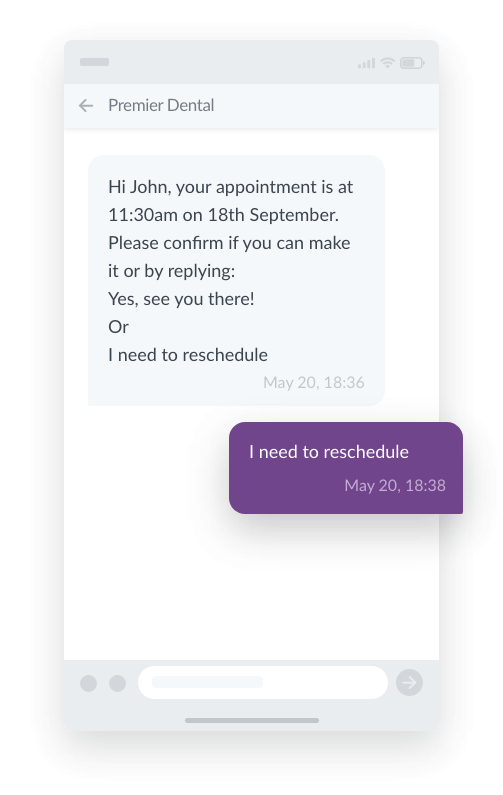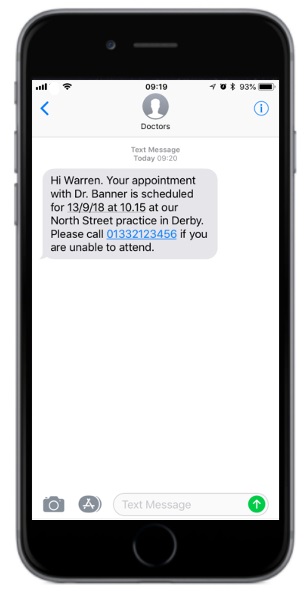Missed appointments mean lost revenue. If your business is impacted by no-shows, it might be time to look at SMS appointment reminders…
It’s estimated that missed appointments cost the NHS more than £650,000 a month. Not only that, but they push back waiting times too, as others could have been seen during the unused time slot. And it isn’t just the healthcare sector that’s affected. Appointments are also the lifeblood of dentists, opticians, hairdressing and beauty salons, car garages, estate agents and many more. The number of no-shows to restaurant, pub and bar bookings almost doubled in 2023, with 12% of customers not attending, costing the hospitality industry £17.59bn per year in lost revenue. If your business or organisation is affected by no-shows, sending appointment reminder text could help you to save precious time, money and resources.
Read our guide below to learn more about SMS appointment reminders or start sending SMS reminders and confirmations with Esendex.
Why choose SMS for reminders?
SMS reminders help you to cut through the noise. By sending a scheduled appointment reminder text and updates, you can minimise the risk of no-shows and customers will have an easy-to-view digital record of their appointment details.

The majority of the population has access to a mobile phone, so SMS is an inclusive communication tool, especially for those who struggle with internet access and/or digital skills. Text messages can be scheduled at timely intervals – whether this is out of hours, at the time of booking, 24-hours before the appointment or on the day.
Benefits of using SMS for appointment reminders
There are other ways to send reminders and appointment information, but SMS is particularly effective and has many benefits over other communication channels. Firstly it has an open rate of 98%, meaning more recipients are likely to see and interact with it, which could mean less missed appointments. It’s cost effective too, with texts costing as little as 2.5p to send, and it doesn’t take up valuable time or resources as the messages are drafted within a 160-character limit.
Texts can be personalised to the recipient, and feel more immediate because they are sent directly to a customer’s personal phone. A message delivered to somebody’s phone with their name in the message preview will naturally prompt them to open it. Organisations can also include a customised sender ID, so the text is recognised as credible and offers protection against fraud.
Customers expect automated SMS reminders when booking an appointment and many of them rely on it to manage their time.
Whether you send automated SMS appointment reminder text for a one-off appointment or for regularly scheduled ones, you can improve engagement and encourage your customers or patients to use the service again. You can also use SMS surveys to get feedback on their experience and refine your service.
These small benefits add up, freeing up resources to solve bigger challenges. For example in healthcare, you can help to improve health outcomes and make savings, and businesses are better able to maintain cash flow, increase productivity and improve staff satisfaction.
Automating appointment reminder text
Effective appointment reminders and updates wouldn’t be possible without automation. SMS appointments are automatically triggered when someone makes an appointment, and these aren’t limited to office hours. They can also be sent on a mass scale with the highest level of accuracy.

Learn more: Read our Guide to Sending Automated SMS
At Esendex, we’ve developed a simple and easy to use system to enable you to automate texts. We use a rule based system so that you can send automatic confirmations or updates when your customer makes a purchase or appointment. Our system supports bespoke communication workflows and auto-replies, too.
To get started, visit our SMS Automations service page.
Compliance with SMS reminders
With digital communications becoming the standard, you need to consider your customers or patients’ privacy and data security, but also follow data protection rules, including GDPR.
A data breach can have significant reputational, business and financial consequences that are hard to recover from. And for your customers, it can risk their privacy and lead to issues like fraud or identity theft. Customers will lose trust in you if their details are stolen and you can even be subject to fines or lawsuits.
No matter what sector you operate in – whether that’s healthcare, dentistry or retail – you need to have the highest security standards. That means your internal security practices need to be robust and stringent, and external communications need to be factored in. Any customer or patient data has to be securely stored, encrypted if digital and following GDPR, you need consent to send marketing texts or communications.
Read our SMS Compliance Guide to learn more about what you can and can’t do.
How to set up and automate SMS appointment reminder text
1. Choose a reliable provider
When it comes to choosing your provider, look into the security protection they offer and their privacy policy which outlines their data security policies. Are they ISO27001 certified? If so, that means they protect their customer data to the highest standard.
A good SMS appointment reminder service should have the infrastructure to allow you to send thousands of messages and at rapid speed. Other features that are useful include personalisation, scheduling options, bulk SMS, shortcodes and SMS API which enables you to integrate SMS into your existing systems.
Once you are confident in the security and GDPR compliance of the SMS provider, and have explored the available features, check out reviews or case studies so that you can confirm they are the right partner for you.
2. Craft your strategy and messaging
You need to craft an effective and robust messaging strategy to deliver successful SMS automation. With a 160-character limit, your messages need to be to the point, persuasive and clear. They should convey the message and purpose of the communication.
Whether using automation or not, remember that you are communicating with people, therefore your messages need a human touch. You can achieve this through personalisation and tailoring your language, so you get the best possible engagement and success.
3. Evaluate and learn
After implementing your automated SMS, you can measure its success and identify any areas of improvement. You can do this by collecting data on response rates, customer feedback through SMS surveys, and seeing if there has been a noticeable improvement in attendance.
Tracking success
Measuring your return on investment (ROI) is essential. You need to know whether your SMS reminders are working, so you can make key decisions.
Your main goals will be to reduce missed appointments and improve your customer engagement. You can use a data collection metric such as number of responses, data quality and number of opt-outs.
Another option is to calculate the delivery rate to check whether your messages have been delivered and if you need more up-to-date customer information. Calculating the conversion rate will give you insight into who took action, for example, if someone cancelled their appointment because they couldn’t attend.
Finally, working out the cost per conversion will help you compare the performance of SMS to other channels.
To see our product suite and find out how Esendex can help you set up automated reminders for your organisation, browse our business SMS solutions.

